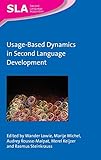Usage-Based Dynamics in Second Language Development / ed. by Wander Lowie, Rasmus Steinkrauss, Merel Keijzer, Marije Michel.
Material type: TextSeries: Second Language AcquisitionPublisher: Bristol ; Blue Ridge Summit : Multilingual Matters, [2020]Copyright date: ©2020Description: 1 online resource (288 p.)Content type:
TextSeries: Second Language AcquisitionPublisher: Bristol ; Blue Ridge Summit : Multilingual Matters, [2020]Copyright date: ©2020Description: 1 online resource (288 p.)Content type: - 9781788925242
- 9781788925259
- Second language acquisition, Study and teaching
- LANGUAGE ARTS & DISCIPLINES / Study & Teaching
- CDST
- DUB
- Marjolijn Verspoos
- SLA
- cognitive approaches to second language learning
- cognitive grammar
- complex dynamic systems theory
- dynamic usage-based
- language development
- language learning
- second language pedagogy
- second language research
- thinking-for-speaking
- usage-based approaches to language development
- usage-based language pedagogy
- online - DeGruyter
| Item type | Current library | Call number | URL | Status | Notes | Barcode | |
|---|---|---|---|---|---|---|---|
 eBook
eBook
|
Biblioteca "Angelicum" Pont. Univ. S.Tommaso d'Aquino Nuvola online | online - DeGruyter (Browse shelf(Opens below)) | Online access | Not for loan (Accesso limitato) | Accesso per gli utenti autorizzati / Access for authorized users | (dgr)9781788925259 |
Frontmatter -- Contents -- Contributors -- Prologue -- Introduction -- 1. Thinking for Speaking in an L2: From Research Findings to Pedagogical Implications -- 2. On the Sample Size Required to Identify the Longitudinal L2 Development of Complexity and Accuracy Indices -- 3. A DUB-Inspired Case Study of Multidimensional L2 Complexity Development: Competing or Connecting Growers? -- 4. A Holistic Person-Centred Approach to Mobile-Assisted Language Learning -- 5. Creativity and Routinisation in L2 English: Two Usage-Based Case Studies -- 6. Attractor States in the Development of Linguistic Complexity in Second Language Writing and the Role of Self-Regulation: A Longitudinal Case Study -- 7. Competence Appraisals: Dynamic Judgements of Communication Competence in Real Time -- 8. Dynamic Changes in Motivation and Willingness to Communicate in the Second Language Classroom: A Multiple Case Study -- 9. Nested Locatives: Conceptual Basis and Theoretical Import -- 10. Getting Out the Word on Phrasal Verbs: It Turns Out Phrasal Verb Construction Meanings are Systematic and Teachable -- 11. The Icing On the Cake? Effects of Explicit Form-Focused Instruction after Two Years of Implicit EFL Learning -- 12. Film Language Integrated Learning: A Usage-Inspired L2 Teaching Approach -- Epilogue -- Index
restricted access online access with authorization star
http://purl.org/coar/access_right/c_16ec
This book honours the contribution of Marjolijn Verspoor to the development and implementation of dynamic usage-based (DUB) approaches in second language (L2) research and pedagogy. With chapters written by renowned experts in the field, the book addresses the dynamics of language, language learning and language teaching from a usage-based perspective. The book contains both theory and empirical work: the initial theoretical chapters present cutting-edge thinking in relation to both the scope of DUB theory and its applications, providing conceptual perspectives from cognitive grammar and linguistics, thinking-for-speaking (TFS), and Complex Dynamic Systems Theory (CDST) approaches, united by their shared underpinnings of language as a dynamic system of conventionalized routines. The second half of the volume showcases state-of-the-art methodologies to study dynamic trajectories of language learning, empirical investigations into the above-mentioned theoretical concepts, and innovative classroom implementations of DUB language pedagogy.
Mode of access: Internet via World Wide Web.
In English.
Description based on online resource; title from PDF title page (publisher's Web site, viewed 25. Jun 2024)


